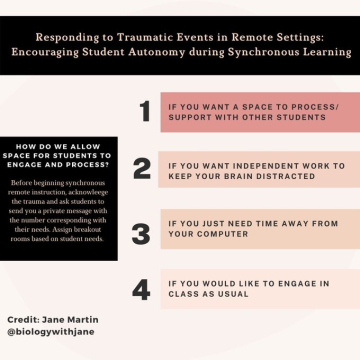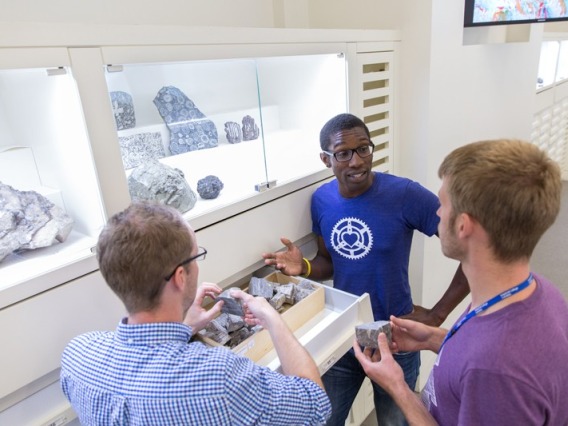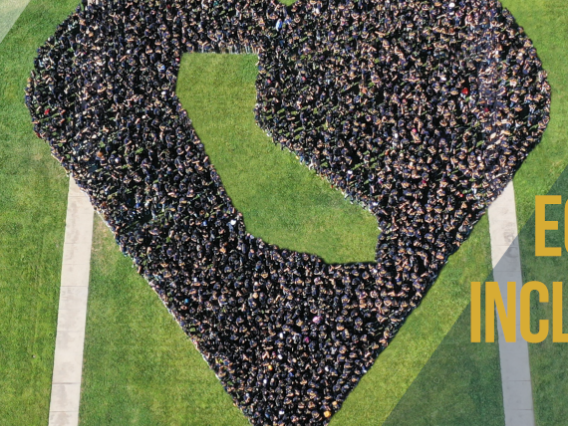Messages
Dear DEI Committees,
Given the violence that occurred during the transition of power, we acknowledge the deep impact it may have on each of you and our campus community. You, your colleagues, and/or your students may be profoundly struggling to process this unprecedented event. There is worry that Inauguration Day may bring more violence and upheaval, and many of us fear for the safety and security of ourselves and others. We wanted to reach out and support the campus DEI Committees, particularly because campus community members may turn to you during this time.
These events may impact our campus members differently. The vastly disparate response to and treatment of the peaceful BLM protestors compared to the Capitol rioters have left many in the movement for racial justice re-traumatized and appalled. Additionally, this happened on top of a global pandemic that has disproportionately impacted Indigenous communities, older adult communities, and communities of color. International and immigrant students and staff who have fled political violence and repressive regimes may be especially triggered by witnessing these events. Thus, some groups may especially need support at this time.
Until Inauguration Day, we hope that you give yourself, your colleagues, and students the space and time to process feelings and reactions, as well as flexibility in work hours and deadlines. Make time for self-care. We are here to support you and your Committees as you navigate this unprecedented terrain. Below, we offer specific resources to help you navigate these difficult times.
How can I create spaces for listening and civil conversations?
Listening spaces and spaces for civil conversations help our community members feel supported, but not all spaces are created equal.
- This Forbes piece offers key suggestions for developing such spaces.
- Engaging Differences offers videos about how to build bridges across divides.
- The University of Arizona’s National Institute for Civil Discourse provides many resources around civil conversations related to U.S. politics.
What can I do to support students?
- Offer students opportunities to talk with you about how current events are impacting them. Teaching the day after a crisis offers suggestions to not rush to intellectualize, validate and offer choices for support, and model not-knowing.
- Open your classes by acknowledging that we are all living through a time of extraordinary transition, and that it is normal to experience anxiety about the impact of this transition. Equity Advisors at UCLA offers these example statements that you could make, which don’t make assumptions about anyone’s political views.
- I realize that with everything that is currently happening in the country, it is hard to focus on coursework. Thank you for coming to class.
- We live in a challenging time. I acknowledge the anxiety and uncertainty that you are feeling. Know that I am here for anyone who needs to be heard and needs time to process all that is happening now.
- Jane Martin shares 4 choices you can offer during synchronous learning so students may better cope with emotionally charged events.

- Consider structuring your courses so that there are not exams or major project due dates during Inauguration week. Offer more flexible scheduled work hours to student staff.
- Share Initiatives for Organizational Inclusion's Election Support Resources website with students.
What can I do to support staff and colleagues?
- Acknowledge that staff may be experiencing anxiety around the transition of power. The Harvard Business Review discusses how to talk to your teams about the violence at the US Capitol using encouraging and inclusive dialogue.
- Avoid saying things like, “Just stay hopeful,” in response to colleagues sharing their anxieties with you. Instead try communication strategies that center the experiences and realities of the colleague talking with you (e.g., “I understand.”, “What can I do to help you feel supported?”, “I’m listening.”).
- Offer opportunities during staff meetings to share their feelings about current events before digging into the agenda for the meeting. You could also start a staff or faculty meeting by offering modified versions of Jane Martin’s 4 Choices for Engagement (see image in previous section).
How can I practice self-care?
- Campus Health offers a multitude of resources to support well-being and self-care.
- Initiatives for Organizational Inclusion provides a list of self-care resources.
Please feel free to reach out if we can be of further support.
Good Afternoon, DEI Committees.
As we head into the final week of Black History Month and prepare for Women’s History Month in March, we wanted to provide you with D&I updates and resources that can assist you in your work. As always, we are grateful for your partnership and look forward to continuing our support of the DEI Committees.
Rise in Anti-Asian Violence
The Office of Diversity and Inclusion stands in solidarity with the Asian, Asian American, and Pacific Islander (APIDA) communities in denouncing the increasing acts of violence targeting these communities. We ask our DEI committees to be vigilant and also active allies for members of the APIDA community. To date, more than 2,808 reports have been received by Stop AAPI Hate documenting discrimination and violence against the APIDA community. These attacks include verbal harassment, shunning, denial of services and access to public spaces, and physical assault which, in some cases, have led to death. Attacks on Southeast and East Asians – especially on elders within the community – have spiked considerably. As we respond to rising anti-Asian violence as a university community, we encourage you to identify ways to support APIDA and API students, faculty, and staff in similarly pro-active, community-focused ways.
We anticipate that you might witness or hear about anti-API harassment or assaults. These incidents could range from verbal statements or messages, messages in Zoom or Teams chats, and/or racist backgrounds in Zoom, to racially motivated assaults. We also anticipate that you might be called on to help your unit address xenophobia, anti-Asian incidents, and/or solidarity across communities. If anyone (faculty, staff, student, or community member) experiences bias please encourage them to report the incident to the Bias Education and Support Team. If not submitted anonymously, BEST will follow up on bias reports with outreach to, and education and support for all people involved in and impacted by the incident. Please also share the resources on our website with your communities.
These resources include how to support a member of the community that has been harassed, how to get involved in important conversations on this issue, and where to learn more about the APIDA community. Additionally, if your DEI committee or anyone in your unit would like to discuss how to address a specific incident or approach to providing support to the APIDA community, our staff would be happy to provide consultation during our DEI Consultation hours (see below).
Finally, the combined weight of the rising anti-Asian violence and ongoing impacts of the COVID-19 global pandemic have had significant effect on the overall health and wellness of many in the APIDA community. This impact is especially pronounced right now, as many in the APIDA and global Asian community celebrate Lunar New Year without being able to come together. Please know that students seeking mental health and wellness support can reach out to Asian Pacific Student Affairs (APASA) or International Student Services (ISS), in addition to CAPS for culturally responsive support and mental healthcare. Beyond campus, Asians for Mental Health has a thread of APIDA therapists who are willing to offer reduced fee or free sessions to the APIDA and API community.
Zoombombing & Other ‘Zoom’ Microaggressions
Incidents of racism, anti-Black, anti-Semitism, and other forms of hate occurring in Zoom classes and meetings continue to occur. Whether the incident is a zoombombing, where individuals gain access to zooms and engage in hateful behavior, or the incident involves hate imagery or text in virtual backgrounds or Zoom names, these incidents are unacceptable. We must continue to engage in action and conversation to speak up against hate, protect our community as proactively as possible, and provide support to all members of the community who have experienced bias, hate, and discrimination. This piece on Zoombombing and Racial Time Theft provides a clear accounting of the impact of Zoombombing on individuals and committees working to build inclusive communities. The UITS Zoom Security Options page provides step-by-step instructions on how to keep Zoom environments safe. Consider providing support for your communities by creating a standardized, University of Arizona branded Zoom background for classes that highlights your college or the University. The standard background can shift the focus to the content of the course and not the home environment of students. In addition to shifting focus towards the course material, standardized backgrounds provide low-income students or housing insecure students with added protection from sharing their home environment with their peers.
Black History Month Programming – Still Time to Engage & Learn!
This month, we joined our campus community in celebrating the rich history, legacy, and contributions of the Black Diaspora. Although our celebrations were virtual, from the College of Fine Arts to the College of Medicine to Africana Studies – we engaged and learned about the work that struggles toward inclusion and the long road that lies ahead. While we believe in honoring Black History every day, we encourage you to join our colleagues across the campus at the following events as we bring February to a close:
- The College of Humanities brings you ‘Who Framed Rosa Parks: The Photographic Legacy of Civil Rights Icons’ - February 24th 4:00pm – 5:00pm: featuring Brenna Greer, Associate Professor of History, Wellesley College
- Support Cultural & Resource Centers through the new UA Black History Month Cultural Logo
UA Access & Gender Identity and Pronouns
The functionality to report gender identity and pronouns is now LIVE in UAccess Employee. To view this functionality (and update your information, if you’d like) can be accessed here:
- UAccess Employee > Personal Information > Gender Identity and Pronouns
The Office of the Registrar has compiled some useful information and resource guides about this.
Diversity, Equity & Inclusion Consultation Hours
Diversity & Inclusion hosts weekly Diversity, Equity & Inclusion drop in hours between 10:00-1:00 each Wednesday. During this time, we provide private consultation about diversity, equity, and inclusion practices, structures, and ideas that will help your organization, area, class, or unit be more equitable and inclusive of our diverse population at the University of Arizona. No information that you share will provided to your supervisors or colleagues.
Dear DEI Committees & D&I Leaders,
It is with deep sorrow that we write to you to provide information and resources in the wake of the tragic loss of one our students, Forrest Keys. Forrest was a sophomore studying Communications in SBS. Forrest, an African American male, recently joined Zeta Beta Tau Fraternity and was an exceptionally accomplished student. Our hearts and thoughts are with the Keys family as they navigate this senseless loss of life. While the family has asked for privacy at this time, we are committed to supporting our Wildcat community through this tragedy.
We ask you to share resources with students, staff, and faculty so that they can find spaces to be in community with others, to heal, and to find support in how to make sense of this tragedy and how best to move forward. In responding to our community’s needs and collective grief, we encourage faculty to offer students the opportunity to talk about their experiences and how they are feeling, and where possible to offer flexibility with imminent due dates as students process their grief. We know that the days and weeks ahead will be challenging, and we anticipate that there will be a heightened need for mental health and wellness support; please share the resources below to support your students, staff, and faculty.
Resources for Students
- Healing Space: Tuesday, 2/23/21
- 5:00-6:30 p.m. (Arizona) Register in advance
- This Healing Space is a time to gather to process the loss of Forrest Keys. The intention for this time is to hold space for our community in the wake of this devastating loss. The Healing Space will be facilitated by Ivy Banks, Associate Vice Provost for Diversity and Inclusion, who will be joined by CAPS counselors to provide support for students. After registering, you will receive a confirmation email containing information about joining the meeting.
- Meditation 101 w/ Desiree @AASA_UOFA Wednesday 2/24/21 @ 9am
- Desiree Gonzales will be hosting an Instagram Live meditation 101 workshop and guided meditation & breathwork session via AASA Instagram.
- Free bi-weekly Students of Color Online Support Group with CAPS
- Tuesdays at 2:00 PM and Thursdays at 11 AM
- Schedule an appointment with our AASA Director or AASA Mental Health Advocate
- These are appointments for Black students in need of one-on-one support from the AASA Director or the AASA Mental Health Advocate. You can schedule directly at this link.
- Guerrero Student Center Healing Circle led by community members from Calpolli Teoxicalli on Thursday 2/25/21 @5:30PM.
- Zoom Link: https://arizona.zoom.us/j/83225517943
- APASA Healing Space with Dr. Ishani Deo, Thursday from 3:00-4:00PM. Join through Zoom 875 0244 1252. Open to all, not just APIDA identifying students.
- Online walk-in counseling through CAPS: Triage is open Monday through Friday, 9am-3:30pm. Click here to get started.
- Additional CAPS Resources
Other Events & Resources across the Cultural & Resource Centers:
- Radical Care Circles w/Blu, Thursday March 3, 5-6pm
- Email slau1@arizona.edu(link sends e-mail) for link
- Join the WGRC & LGBTQRC Mental Health and Wellness Series for weekly "Radical Care Circles" with Blu. Through these Radical Care Circles, we hope to create safer & softer spaces of support for self & collective healing though consciously fostering communities of care and connection. No expectations, no pressure, just bring your whole self and come in any capacity you can.
- ISRC Healing Space, Thursdays 6-8pm (confirming)
- Healing Spaces are weekly affirming spaces that foster community for students with undocumented, DACA, refugee or other immigration statuses. The space is intended for students with DACA, undocumented, refugee status or from mixed-status families. Email isrc@email.arizona.edu(link sends e-mail) (link sends e-mail) for the Zoom link.
Resources for Faculty & Staff
- Life Work Connections offers a number of services, including employee assistance counseling for which co-payments are being waived.
- Resilient Arizona provides crisis counseling that is free and confidential.
- Wellness Ambassadors are employee volunteers who promote workplace wellness and create a culture of well-being.
- DEI Consulting Hours are drop-in hours on Wednesdays from 10:00-1:00, where faculty and staff can come to receive private consultation about any DEI issues or concerns.
- The Bias Education & Support Team provides education and support to anyone who has been impacted by a bias incident on campus.
As we mourn the loss of a member of the Black community, a member of the Fraternity & Sorority Life community, a member of the SBS community, a member of the Wildcat community - the enormity of the impact of the loss to our respective communities cannot be overstated. Please share the resources and commit to supporting each other as we grieve the loss of Forrest.
Dear Students and Colleagues,
Our community is deeply saddened by the recent tragic mass shootings in Monterey Park and Half Moon Bay, California. These terrible events affect all of us. Because Asian Americans were targeted during a Lunar New Year celebration, the Monterey Park tragedy has had a particularly profound impact on members of the Asian American community.
We acknowledge that many members of our University community may be negatively affected by this tragedy. In times like this, it is important to take care of yourselves and one another. I encourage you to take advantage of the campus resources available to you.
- Students in need of mental health support can contact Campus Health’s Counseling & Psych Services by calling 520-621-3334 or dropping in at one of CAPS locations during operating hours. As part of the CAPS response, embedded counselors are available in the cultural centers. Visit caps.arizona.edu/support to learn more about the help available to you.
- Employees, their dependents and members of their households can access mental health resources through ComPsych, the University'semployee assistance service, by calling 877-327-2362 (TTY: 800-697-0353).
Sincerely,
Francisco Moreno, M.D.
he, him, his
Interim Vice President and Chief Inclusion Officer
The University of Arizona




